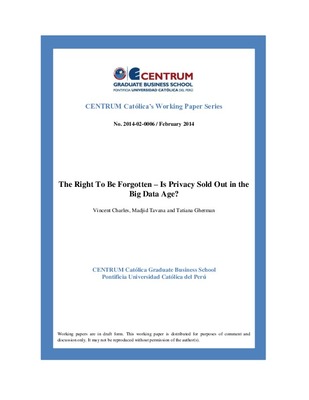| dc.contributor.author | Vincent, Charles | |
| dc.contributor.author | Tavana, Madjid | |
| dc.contributor.author | Iona Gherman,Tatiana | |
| dc.date.accessioned | 2019-09-03T00:14:34Z | |
| dc.date.available | 2019-09-03T00:14:34Z | |
| dc.date.issued | 2014 | |
| dc.identifier.uri | https://repositorio.pucp.edu.pe/index/handle/123456789/166787 | |
| dc.description.abstract | The potential of big data has exceeded the expectations of most organizations. However, despite its vast importance and application, some important aspects of big data remain the subject of debate. One of the most sensitive and worrisome issues for big data is the privacy of personal information. The purpose of this paper is to explore how the major theories of philosophical ethics may be used as a referential framework for conceptualizing the evolution of the concept of privacy of personal information in the big data era. We identify a gap in big data research and suggest that while privacy has been extensively explored in different settings, it has not been sufficiently studied relative to the social and technological changes in the big data era. We attempt to fill this gap by proposing that the study of privacy be closely tied to the evolution of the social structure. | es_ES |
| dc.language.iso | eng | es_ES |
| dc.publisher | CENTRUM Publishing | es_ES |
| dc.rights | info:eu-repo/semantics/openAccess | es_ES |
| dc.rights.uri | http://creativecommons.org/licenses/by-nc-nd/2.5/pe/ | * |
| dc.subject | Big data | es_ES |
| dc.subject | Data analytics | es_ES |
| dc.subject | Information privacy | es_ES |
| dc.subject | Ethics | es_ES |
| dc.subject | Human rights | es_ES |
| dc.title | The Right To Be Forgotten – Is Privacy Sold Out in the Big Data Age? | es_ES |
| dc.type | info:eu-repo/semantics/workingPaper | |
| dc.type.other | Documento de trabajo | |
| dc.subject.ocde | http://purl.org/pe-repo/ocde/ford#5.02.04 | |
| dc.publisher.country | PE | |
| dc.identifier.doi | http://dx.doi.org/10.7835/ccwp-2014-02-0006 | |


